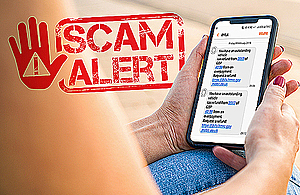DVLA warns motorists to be aware of scams
DVLA has revealed a 20% rise in scams reported to their contact centre, with 1,538 reports about suspected vehicle tax scams during the last 3 months of 2019.

DVLA has released pictures of some of the cons being used by scammers to trick motorists into handing over their money.
It comes as new figures show a 20% increase in scams reported to DVLA, with 1,538 reports made to DVLA in the last three months of 2019.
The reports of suspected web, email, text or social media scams were up from 1,275 in the same period in 2018. DVLA has released the images of recent scams reported to help motorists be aware of what to look out for and issue a clear warning that if something offered online or by text message appears too good to be true, then it almost certainly is.
Scammers are targeting unsuspecting customers with links to services that do not exist and messages of tax refunds, all of which are fake.
The reports also show that driver and vehicle documents are for sale on the internet. DVLA is advising anyone with concerns about any calls, texts, emails or suspicious activity online, to always report these to the police via Action Fraud immediately.
DVLA chief information security officer David Pope said:
We’ve released examples of real life scams to help motorists understand when a scam is at work. These websites and messages are designed to trick people into believing they can access services that simply don’t exist such as removing penalty points from driving licences.
All our tax refunds are generated automatically after a motorist has told us they have sold, scrapped or transferred their vehicle to someone else so we don’t ask for anyone to get in touch with us to claim their refund.
We want to protect the public and if something seems too good to be true, then it almost certainly is. The only trusted source of DVLA information is GOV.UK.
It is also important to remember never to share images on social media that contain personal information, such as your driving licence and vehicle documents.
A spokesperson for Action Fraud said:
This can be a stressful time of year, sorting out finances for the year ahead. Fraudsters are aware of this and are using different ways to trick people.
Taking a couple of minutes to familiarise yourself with a few simple online safety tips can be significant in protecting yourself from becoming a victim of online fraud.
You should always be cautious when sharing personal information online and avoid being scammed by only using GOV.UK for government services online, such as the DVLA.
If you believe you have been a victim of fraud, please report it to us.
Notes to editors
-
Fraud or cyber crime can be reported to Action Fraud by calling 0300 123 2040 (Monday to Friday, 8am to 8pm), or by using their online reporting tool, which is available 24/7.
-
Last year the DVLA published its tips for motorists to stay safe online.
-
The Annual Fraud Indicator 2017 estimated the cost of fraud to the UK was £190bn a year.
-
In the last quarter of 2019 there were 1,538 complaints to DVLA regarding suspected web, email, text or social media scams. That represented a 20% increase on 1,275 in the same period in 2018.
-
Action Fraud is the UK’s national reporting centre for fraud and cyber crime where you should report fraud if you have been scammed, defrauded or experienced cyber crime in England, Wales and Northern Ireland.
-
Safer Internet Day 2020 was celebrated globally on Tuesday 11 February. It aims to inspire a national conversation about using technology responsibly, respectfully, critically and creatively. This year’s theme is ‘Together for a better internet’.
Press office
DVLA Press Office
Longview Road
Morriston
Swansea
SA6 7JL
Email press.office@dvla.gov.uk
Only for use by journalists and the media: 0300 123 2407